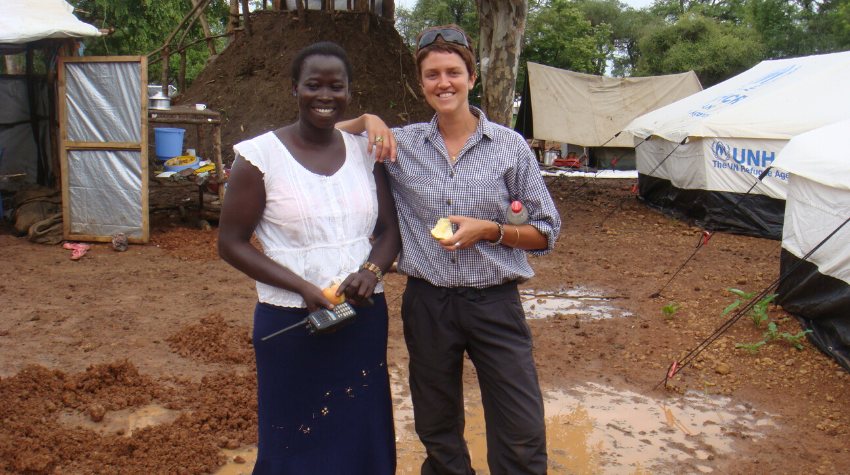Jacqui Symonds began her career in environmental management, working for the state government in South Australia, before joining a humanitarian roster and applying her skills to water and sanitation projects abroad. She has contributed to health and development outcomes in Vanuatu, Liberia, South Sudan and Iraq, and has been involved in humanitarian responses in many other countries. She now uses her wealth of experience to train professionals curious about transferring their skills to humanitarian work. She shares with us her journey into the sector as well as some tips for anyone curious about humanitarian work.
Taking the first step into humanitarian aid
Jacqui’s first role was a deployment to Liberia in West Africa where she worked in water, sanitation and hygiene with members of the local community.
“During this deployment, we had engineers in our team who were installing infrastructure such as hand pumps and toilets, however a holistic approach on the issue also required professionals in health, and hygiene promotion. My role was to educate the community about the basics – hand washing, family hygiene and how to minimise the spread of diseases.”
“Working in Liberia was an eye-opener that really kick-started my humanitarian career. I felt really proud to be working in this environment and I wanted to continue to use my skills to help communities that had very little.”
Returning to Australia, Jacqui was offered another role, this time in Indonesia, helping communities with water and sanitation two years on from the 2004 Tsunami. Jacqui had taken a leave of absence from her day job to go to Liberia but in order to take the role in Indonesia, she needed to make a choice.
“In order to take this deployment, I had to choose whether to stay in my job or go - and I decided to go. I am really glad I did, as it opened up a whole new world for me,” said Jacqui.
The satisfaction of making a difference
Jacqui acknowledges there are many challenges working in humanitarian aid, including witnessing people living in extremely difficult, disaster-affected contexts. However, she is motivated to continue her work through the connections she makes with people and the difference she can make to their quality of life -- giving her a sense of purpose and satisfaction that drives her career.
“When you come home to running water, or step out the door and there is a tram or bus, you realise the privilege and freedom we have – it really makes you stop and reflect.”
“I find it is the little things that are more valuable and influential on my life than the big things. While you can spend a lot of your time on project management and getting things done, at the end of the day it’s about helping people. The interactions and experiences I have had with individual people have been the most rewarding and meaningful to me. It’s this experience I draw on to help people understand what humanitarian work is all about, and something that RedR Australia imparts through our training,” said Jacqui.
A wide range of skills are in demand
Jacqui stresses that an ever broadening range of skill sets are required to respond to ongoing complex emergencies.
“Don’t rule out your skills,” she says. “You may think the work you do in your day job has nothing to do with the humanitarian sector, but there are many cross-cutting issues.”
In Jacqui’s current role as Senior Humanitarian Trainer at RedR Australia, she uses her field expertise to deliver a suite of courses designed to prepare diverse professionals for work in the humanitarian field.
“The collective field experience of the trainers makes the RedR training extremely unique and of a really high quality.”
Among these courses is the Water, Sanitation and Hygiene in Emergencies (WASH) course, which has been designed for engineering and public health professionals, and the Essentials of Humanitarian Practice (EHP). EHP is for professionals from a range of backgrounds seeking to understand the foundations of humanitarian practice, or to test out whether the sector is right for them.
“The RedR training courses ensure people are fully equipped to deal with lots of different situations in the field, combining their existing technical expertise with crucial knowledge of the humanitarian sector,” explains Jacqui.
*Read Jacqui's five top tips for aspiring humanitarians!*
Find out about our training courses, learn about joining our roster, or get in touch with any other questions.
_______________
Image: Jacqui with colleague Stella in Gendrassa camp where they lived in UNHCR tents and worked providing safe water, sanitation and hygiene to Sudanese refugees. Words by: Lucy Piper


